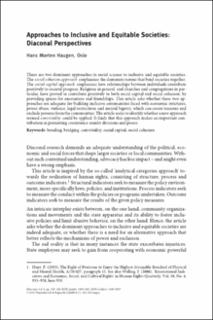Approaches to inclusive and equitable societies: Diaconal perspectives
Peer reviewed, Journal article
Published version
Permanent lenke
https://hdl.handle.net/11250/3127288Utgivelsesdato
2015Metadata
Vis full innførselSamlinger
- Artikler / Articles [1186]
- Publikasjoner fra CRIStin [1133]
Originalversjon
Diaconia. Journal for the Study of Christian Social Practice. 2015, 6 (2), 150-166. 10.13109/diac.2015.6.2.150Sammendrag
There are two dominant approaches in social science to inclusive and equitable societies. The social cohesion approach emphasizes the dominant norms that bind societies together. The social capital approach emphasizes how relationships between individuals contribute positively to societal progress. Religions in general, and churches and congregations in particular, have proved to contribute positively to both social capital and social cohesion, by providing spaces for encounters and friendships. This article asks whether these two approaches are adequate for building inclusive communities faced with economic strictures, power abuse, violence, legal restrictions and mental bigotry, which can create tensions and exclude persons from the communities. The article seeks to identify whether a new approach termed conviviality could be applied. It finds that this approach makes an important contribution in promoting coexistence amidst divisions and power.
Beskrivelse
Open access publication licensed under a CC-BY-NC-ND 4.0 International License

